We Will Dance Our Truth
Now available in both hard and soft covers!
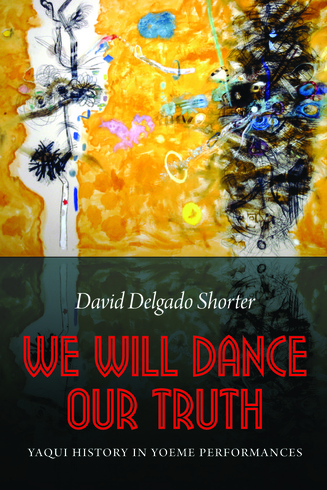
An extraordinary work of engaged ethnography, We Will Dance Our Truth questions familiar oppositions of myth and history, orality and writing. Shorter brilliantly argues that Yoeme prophecies and ritual acts are old, and continuing, ways of inscribing place and making history. He writes with poetic sensitivity, intellectual rigor, and a deep commitment to Yoeme sovereignty.
~ James Clifford
Author of The Predicament of Culture and Routes, and Returns.
In this innovative, award-winning [2009 Chicago Prize], and performative approach to the expressive culture of the Yaqui (Yoeme) people of the Sonora and Arizona borderlands, David Delgado Shorter provides an altogether fresh understanding of Yoeme worldviews. Based on extensive field study, Shorter’s interpretation of the community’s ceremonies and oral traditions as forms of “historical inscription” reveals new meanings of their legends of the Talking Tree, their narrative of myth-and-history known as the Testamento, their fabled deer dances, funerary rites and church processions.
Working collaboratively with Yoeme communities, his scrupulous investigation challenges received wisdom from both anthropological and New Age perspectives, demonstrates how Yoeme performances provide a counter-discourse to earlier understandings of colonialism and conquest, and updates our knowledge of contemporary Yoeme society. Through Shorter’s vivid descriptions and penetrating analyses, we see for ourselves how today’s Yoemem navigate the tribulations and opportunities of the twenty-first century.
"David Shorter, “the professor who calls us Yoeme,” has written an intensely personal and wonderfully accessible exploration of sources historians like me typically misunderstand or ignore: ritual movement, performance, and belief. He shows us how these “unwritten” markers can inspire new interpretations and uncover new dimensions of experience. Shorter’s book contains both fascinating theoretical insights and a stunning new approach to Yaqui history."
~ Frederick E. Hoxie
Swanlund Professor, University of Illinois, Urbana-Champaign
“The persistence, creativity, and intelligence of the Yoemem are the center and guiding light of this detailed and nuanced account. David Shorter appropriately and impressively tips the balance in favor of the people whose stories he tells as he grapples with their history and how scholars can most effectively be in conversation with those they write about.”
~ Robert Warrior
Author of Tribal Secrets: Recovering American Indian Intellectual Traditions
“Dr. Shorter’s work among the Yoemem is quite extra-ordinary because he has respectfully and carefully portrayed Yoeme ways of life. The reader, here, can learn about the Yoemem daily, ordinary lives as well as their more respected, ritual and ceremonial traditions.”
~ Felipe S. Molina
Yoeme Deer Singer and Co-Author of Yaqui Deer Songs
"I strongly recommend this book. It will break new ground and revive old ways of viewing narrative, religion, performance, and ethnography. It is a wonderful contribution to the literature of Native American and Indigenous studies and should prove incredibly useful in graduate (and some undergraduate) courses everywhere. I for one cannot wait to introduce my students to We Will Dance Our Truth."
~ Jeffrey P. Shepherd, Studies in American Indian Literatures.
To read this full review, please click here!
"While the work is centrally about the Yoeme of Potam . . . it is also about how we might conduct anthropological work with indigenous peoples who are concerned more than ever that whatever we write be of use to them."
~ Kathleen Fine-Dare, Journal of Anthropological Research.
To read this full review, please click here!
"As someone who has worked for a number of years with Native Americans, I find this work to be a model of responsible scholarship toward Native communities. Shorter takes seriously the words and truths of his consultants."
~ Anthony Webster, Journal of American Folklore
To read this full review, please click here!
"Shorter breaks new ground in relating history and ethnography, in contributing to the study of Native American religions, and in emphasizing the significance of spatial relationships to cultural realities. The book will be appreciated as a contribution to Yoeme ethnography, but also for its general importance in religious studies, performance theory, ethnicity, and ethnohistory. Shorter's interests cross many disciplines in the humanities and social sciences; this is a book worth reading."
~ Raymond J. Demallie, Journal of Folklore Research.
To read this full review, please click here!
"This work is a major contribution to the body of Yoeme study."
~ Margaret Loghry, Pima County Library
~ James Clifford
Author of The Predicament of Culture and Routes, and Returns.
In this innovative, award-winning [2009 Chicago Prize], and performative approach to the expressive culture of the Yaqui (Yoeme) people of the Sonora and Arizona borderlands, David Delgado Shorter provides an altogether fresh understanding of Yoeme worldviews. Based on extensive field study, Shorter’s interpretation of the community’s ceremonies and oral traditions as forms of “historical inscription” reveals new meanings of their legends of the Talking Tree, their narrative of myth-and-history known as the Testamento, their fabled deer dances, funerary rites and church processions.
Working collaboratively with Yoeme communities, his scrupulous investigation challenges received wisdom from both anthropological and New Age perspectives, demonstrates how Yoeme performances provide a counter-discourse to earlier understandings of colonialism and conquest, and updates our knowledge of contemporary Yoeme society. Through Shorter’s vivid descriptions and penetrating analyses, we see for ourselves how today’s Yoemem navigate the tribulations and opportunities of the twenty-first century.
"David Shorter, “the professor who calls us Yoeme,” has written an intensely personal and wonderfully accessible exploration of sources historians like me typically misunderstand or ignore: ritual movement, performance, and belief. He shows us how these “unwritten” markers can inspire new interpretations and uncover new dimensions of experience. Shorter’s book contains both fascinating theoretical insights and a stunning new approach to Yaqui history."
~ Frederick E. Hoxie
Swanlund Professor, University of Illinois, Urbana-Champaign
“The persistence, creativity, and intelligence of the Yoemem are the center and guiding light of this detailed and nuanced account. David Shorter appropriately and impressively tips the balance in favor of the people whose stories he tells as he grapples with their history and how scholars can most effectively be in conversation with those they write about.”
~ Robert Warrior
Author of Tribal Secrets: Recovering American Indian Intellectual Traditions
“Dr. Shorter’s work among the Yoemem is quite extra-ordinary because he has respectfully and carefully portrayed Yoeme ways of life. The reader, here, can learn about the Yoemem daily, ordinary lives as well as their more respected, ritual and ceremonial traditions.”
~ Felipe S. Molina
Yoeme Deer Singer and Co-Author of Yaqui Deer Songs
"I strongly recommend this book. It will break new ground and revive old ways of viewing narrative, religion, performance, and ethnography. It is a wonderful contribution to the literature of Native American and Indigenous studies and should prove incredibly useful in graduate (and some undergraduate) courses everywhere. I for one cannot wait to introduce my students to We Will Dance Our Truth."
~ Jeffrey P. Shepherd, Studies in American Indian Literatures.
To read this full review, please click here!
"While the work is centrally about the Yoeme of Potam . . . it is also about how we might conduct anthropological work with indigenous peoples who are concerned more than ever that whatever we write be of use to them."
~ Kathleen Fine-Dare, Journal of Anthropological Research.
To read this full review, please click here!
"As someone who has worked for a number of years with Native Americans, I find this work to be a model of responsible scholarship toward Native communities. Shorter takes seriously the words and truths of his consultants."
~ Anthony Webster, Journal of American Folklore
To read this full review, please click here!
"Shorter breaks new ground in relating history and ethnography, in contributing to the study of Native American religions, and in emphasizing the significance of spatial relationships to cultural realities. The book will be appreciated as a contribution to Yoeme ethnography, but also for its general importance in religious studies, performance theory, ethnicity, and ethnohistory. Shorter's interests cross many disciplines in the humanities and social sciences; this is a book worth reading."
~ Raymond J. Demallie, Journal of Folklore Research.
To read this full review, please click here!
"This work is a major contribution to the body of Yoeme study."
~ Margaret Loghry, Pima County Library
To order a signed, softcover, copy of We Will Dance Our Truth, click the "Buy Now" button below. Books ship within three business days.
"indigenous Films" Book series
Editors, Randolph Lewis and David Delgado Shorter
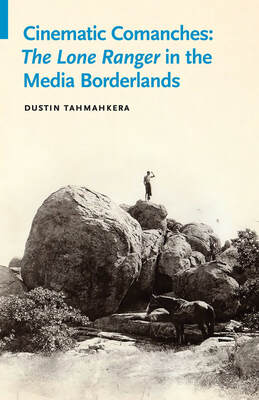
The latest edition to Dr. Shorter's co-edited book series, Indigenous Films!
Co-starring a long list of Comanche actors, filmmakers, consultants, critics, and subjects, Cinematic Comanches moves through the politics of tribal representation and history to highlight the production of Comanchería cinema. From early silent films and 1950s Westerns to Disney’s The Lone Ranger and the story of how Comanches captured its controversial Comanche lead Johnny Depp, Tahmahkera argues that Comanche nationhood can be strengthened through cinema. Tahmahkera’s extensive research includes interviews with elder LaDonna Harris, who adopted Depp during filming in one of the most contested films in recent Indigenous cinematic history. In the fragmented popular narrative of the rise and fall of Comanches, Cinematic Comanches calls for considering mediated contributions to the cultural resurgence of Comanches today.
Co-starring a long list of Comanche actors, filmmakers, consultants, critics, and subjects, Cinematic Comanches moves through the politics of tribal representation and history to highlight the production of Comanchería cinema. From early silent films and 1950s Westerns to Disney’s The Lone Ranger and the story of how Comanches captured its controversial Comanche lead Johnny Depp, Tahmahkera argues that Comanche nationhood can be strengthened through cinema. Tahmahkera’s extensive research includes interviews with elder LaDonna Harris, who adopted Depp during filming in one of the most contested films in recent Indigenous cinematic history. In the fragmented popular narrative of the rise and fall of Comanches, Cinematic Comanches calls for considering mediated contributions to the cultural resurgence of Comanches today.
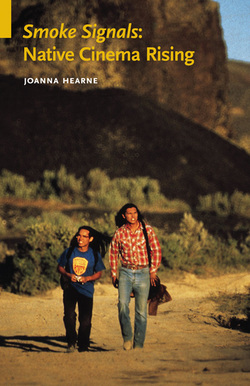
Smoke Signals
Co-editors David Shorter and Randolph Lewis are proud to present an exciting title in their Indigenous Films Book Series. Joanna Hearne’s work foregrounds the voices of the filmmakers and performers—in interviews with Alexie and director Chris Eyre, among others—to explore the film’s audiovisual and narrative strategies for speaking to multiple audiences. In particular, Hearne examines the filmmakers’ appropriation of mainstream American popular culture forms to tell a Native story.
Co-editors David Shorter and Randolph Lewis are proud to present an exciting title in their Indigenous Films Book Series. Joanna Hearne’s work foregrounds the voices of the filmmakers and performers—in interviews with Alexie and director Chris Eyre, among others—to explore the film’s audiovisual and narrative strategies for speaking to multiple audiences. In particular, Hearne examines the filmmakers’ appropriation of mainstream American popular culture forms to tell a Native story.
Navajo Talking Picture
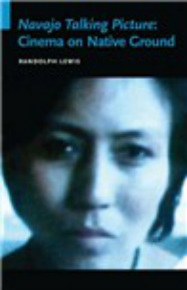
Navajo Talking Picture, released in 1985, is one of the earliest and most controversial works of Native cinema. It is a documentary by Los Angeles filmmaker Arlene Bowman, who travels to the Navajo reservation to record the traditional ways of her grandmother in order to understand her own cultural heritage. For reasons that have often confused viewers, the filmmaker persists despite her traditional grandmother’s forceful objections to the apparent invasion of her privacy. What emerges is a strange and thought-provoking work that abruptly calls into question the issue of insider versus outsider and other assumptions that have obscured the complexities of Native art. Written by Randolph Lewis; Preface by David Shorter. To order your copy, click here.
The Fast Runner
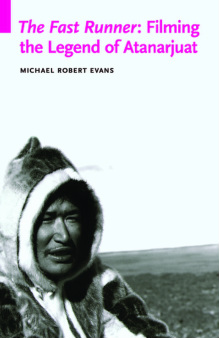
Co-editors David Shorter and Randy Lewis are proud to announce the publication of a book in their series, Indigenous Films, published by University of Nebraska Press. Authored by Michael Evans, “The Fast Runner: Filming the Legend of Atanarjuat” gives both scholarly and general readers all the information they need to view “Atanarjuat” more critically, more sensitively, and with an understanding of the film makers and community at the heart of this amazing film. Get your copy by clicking HERE.